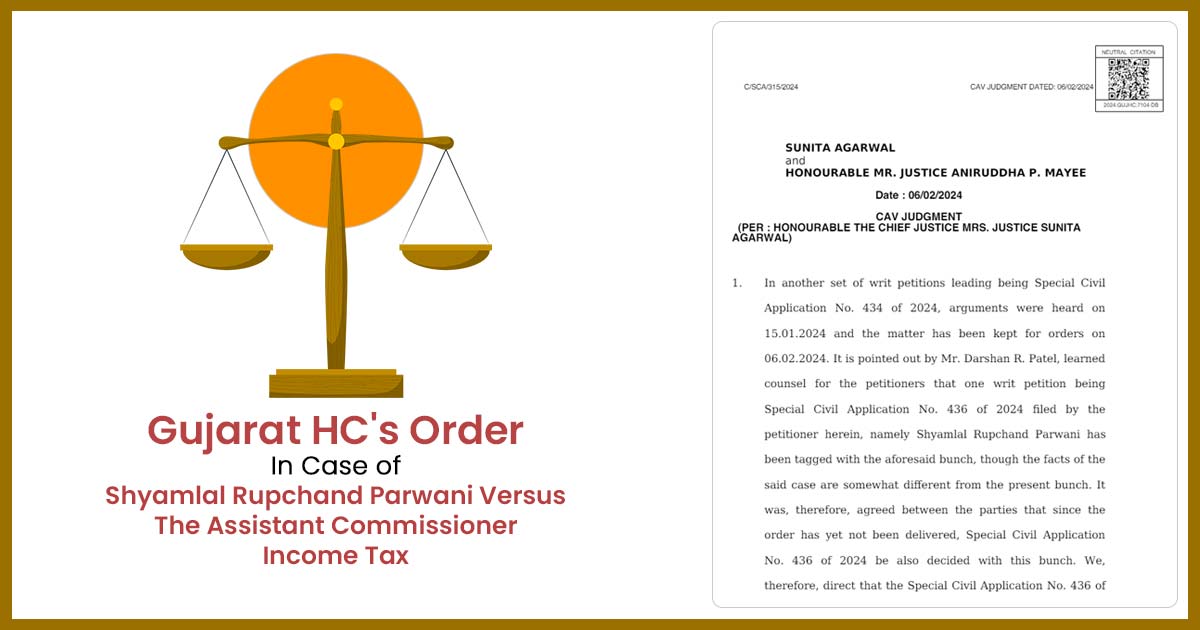
The Gujarat High Court in a judgment for the matter of Shyamlal Rupchand Parwani vs. Assistant Commissioner of Income Tax (ACIT), stated that its position on the jurisdictional factors and procedural propriety concerning notices issued u/s 153C of the Income Tax Act, 1961.
For taxpayers and the administration of tax law in India, this decision has far-reaching implications. The blog quoted the court’s ruling nuances, elucidating its implications for the principle of natural justice and the procedural safeguards envisaged by the Income Tax Act.
Shyamlal Rupchand Parwani vs. Assistant Commissioner Income Tax
The applicant, Shyamlal Rupchand Parwani, contested the notice on 09.06.2022 for the AY 2014-15 issued u/s 153C, alongside the objection disposal order on 02.12.2023 and a following notice u/s 142(1) dated 11.12.2023. The foundations for the challenge were especially the non-provision of the satisfaction note and the lack of incriminating material warranting such a notice.
Key Arguments and Observations of the Court
Absence of Satisfaction Note: The non-provision of the satisfaction note alongside the Section 153C notice generated the proceedings invalid, the applicant contended. The court remarked that while the satisfaction note was not initially furnished, it was subsequently served, albeit not revealed in the writ petition.
Absence of Corrupt Records The applicant argued that no incriminating material explaining the issuance of the Section 153C notice was discovered at the time of the search operation. The court highlighted that the applicant can raise all conceivable objections to the Assessing Officer at the time of the course of assessment proceedings.
Authority and Formal Protections The decision of the court specified the importance of complying with the procedural norms and guidelines furnished via the Central Board of Direct Taxes (CBDT), certainly those concerned with the recording of satisfaction notes.
It shows that the applicant is free to contest the basis of the satisfaction note and the presence of incriminating material at the time of the assessment proceedings.
Final Decision of the Gujarat High Court
Authority and Formal Protections: The refusal of the court to interfere in the issuance of the Section 153C notice emphasizes the principle of judicial constraint in tax cases, allowing administrative processes to evolve as per legal provisions.
Prioritise Adherent Procedures: The judgment stated the importance of compliance with procedural prerequisites by tax authorities, ensuring that the assessees rights are not violated as of procedural lapses.
Limitations on Objections: For taxpayers the court has opened avenues to contest the assumptions and findings of tax authorities at the time of the assessment proceedings, therefore ensuring a fair chance to contest the basis of such tax notices.
Reiteration of Legal Protections: By permitting the applicant to raise objections for the lack of incriminating material and the satisfaction note validity, the court reaffirmed the statute safeguards planned to protect assessees from arbitrary actions by tax authorities.
Absence of Intervention in the Initial Phases: The decision underscores the approach of the court of non-interference at the initial phases of tax proceedings, inspiring taxpayers to use the procedure furnished within the tax administration framework for redressal.
Closure: The ruling of the Gujarat High Court towards Shyamlal Rupchand Parwani vs. ACIT scores a critical juncture in the jurisprudence relating to Section 153C notices. The same cited the deference of the judiciary to administrative processes assuring that the procedural and substantive taxpayers’ rights are not sidelined.
The outlines of the decision should been precisely navigated by the taxpayers and practitioners, acknowledging the importance of procedural compliance and the legal avenues available to contest actions of administrative.
The decision sustains the framework for the tax administration in India and stresses the role of the judiciary in keeping the delicate balance between the enforcement of tax statutes and securing the rights of taxpayers.
| Case Title | Shyamlal Rupchand Parwani Versus The Assistant Commissioner Income Tax |
| Citation | Application No. 315/2024 |
| Date | 06.02.2024 |
| Appearance | Darshan R Patel |
| Respondent | Mr.Varun K.Patel |
| Gujarat High Court | Read Order |









